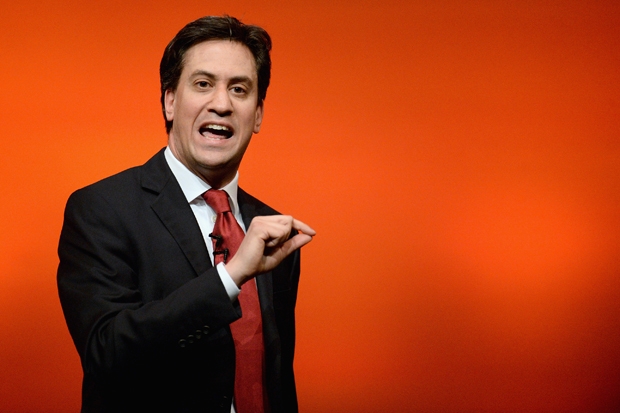[audioplayer src=”http://traffic.libsyn.com/spectator/TheViewFrom22_12_Feb_2015_v4.mp3″ title=”Peter Oborne and Dan Hodges discuss Ed Miliband” startat=1343]
Listen
[/audioplayer]Most political commentators consider Ed Miliband a useless leader. In a narrow sense they are right. He is not very good at getting a positive press or eliciting the support of important outside voices in the media and the business community. Even small stories of no consequence have the potential to turn into minor nightmares for Mr Miliband. The latest of these is his education spokesman Tristram Hunt’s innocuous remark about nuns, transformed by a voracious press into a minor scandal.
Mr Miliband’s bacon sandwich is a far more damaging example of the same phenomenon. But let us take a step backwards and avert our eyes from day to day headlines and political manoeuvres.
Suddenly, Mr Miliband becomes a far more interesting, significant and distinctive figure. Most politicians allow themselves to be shaped by the landscape in which they operate. Only in appearance are they independent figures. In practice they abide by the pieties of the age in which they live. There are certain exceptions to this rule. Enoch Powell — but he never got anywhere. Margaret Thatcher — indisputably.
Like them, Ed Miliband has been his own person, forged his own course and actually been consistent. It is easy to identify four defining phases of his leadership in which he has challenged the underlying structures which govern Westminster conduct.
The first of these came nine months into his leadership, when he confronted the power of the Rupert Murdoch and challenged his bid for the remaining shares in BSkyB. Up to that point every single political leader from Margaret Thatcher on had wooed Murdoch and considered that his support was an essential route to political power.
There is no question that he was effective in changing the terms of trade.








Comments
Join the debate for just £1 a month
Be part of the conversation with other Spectator readers by getting your first three months for £3.
UNLOCK ACCESS Just £1 a monthAlready a subscriber? Log in